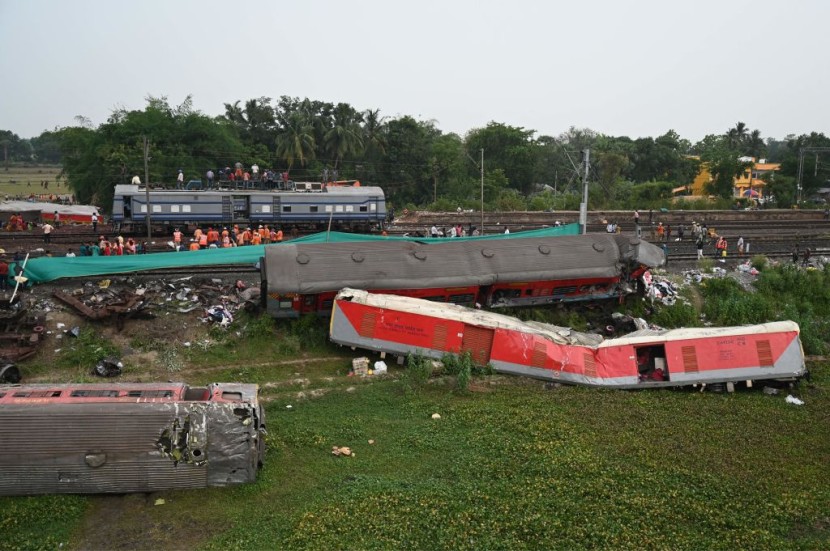
The first of dozens of trains to pass the Bahanaga Bazar rail station, the site of one of the deadliest railway accidents in India's history, after midnight on Monday was a coal train honking its siren in the darkness.
The restoration of the important rail route, which was observed by senior train officials and a large audience, was a step toward mitigating the disruption caused by the catastrophic accident that claimed the lives of at least 275 people and injured more than 1,300 others.
India Train Crash in Odisha
According to NY Times, workers labored over the weekend to remove the wreckage and repair the damaged tracks. With its return, however, officials refocused their efforts on a grim task: identifying approximately one hundred victims whose bodies remain unclaimed in morgues and hospitals.
As of Monday, approximately 170 of the bodies had been identified, according to the chief secretary of the state of Odisha, Pradeep Jena, who added that assistance lines set up for the families of the missing were still receiving calls.
Jena stated that officials hoped to determine the ultimate mortality toll by Monday evening, but they were taking no chances. Monday, the state government posted online a 168-page document containing images of the deceased as well as lists of those being treated in hospitals.
The halted train service prevented the victims' families from traveling to Balasore, in the state of Odisha, to claim their loved ones. On Monday morning, some had arrived via special train services, while others had arrived in vehicles furnished by their local governments. Others had yet to complete the voyage.
Involved in the collision were three separate trains. Friday at approximately 7 p.m. local time in India's eastern state of Odisha, the Coromandel Express train, carrying passengers traveling along India's eastern coast, veered off the correct route and collided with a freight train.
The Superfast Express, transporting approximately 1,000 passengers, struck the two derailed trains shortly thereafter. The Superfast Express traveled between Bangalore and Howrah.
The Indian Railways' flagship Coromandel Express train was traveling from Howrah to Chennai. The high-speed trains collided "head-on," according to the director of fire and emergency services, Sudhanshu Sarangi.
Aditya Kumar Chaudhary, spokesman for the South Eastern Railway zone, said that seventeen passenger compartments derailed. The investigation is still active.
Per Washington Post, initial reports indicate that the problem may be related to problems with railroad signaling systems that instruct drivers to halt, slow down, or transfer tracks. As injured people cried out for assistance, more than 300 rescue workers extracted survivors from the twisted metal and overturned train carriages, according to witnesses.
Local villagers were among the first to assist in the search and rescue, according to West Bengal lawmaker Dola Sen. At a nearby school, emergency teams draped the corpses in white linens in rows for family members to retrieve.
Read Also : US, UK Navies Respond to 'Distressed Call' as Iran Revolutionary Guard Allegedly Harassed Ship
India's Rail Networks
According to government statistics, India has one of the world's greatest rail networks, which transports 22 million passengers daily on 11,000 trains across a 67,000-mile network. Attempts have been made to modernize the system, but the rail network's foundations were laid by the British in the nineteenth century.
The accident occurred the day before Narendra Modi was scheduled to inaugurate a new high-speed train between Mumbai and Goa. Modi canceled the event in order to visit the accident site and a hospital.
Modi, who confronts a general election next year, has vowed to revamp state-run railways while in office, including the renovation of extant stations, the introduction of the country's first domestic rail service, and the launch of the nation's first bullet train by 2026.
However, the accident has raised concerns about the need for the leader to prioritize the improvement of extant infrastructure over the launch of new high-tech projects. Experts have warned that if older infrastructure remains unaltered, the rapid construction of modern railroads could lead to accidents.
Families of the 275 victims filled a hospital in the city of Bhubaneswart to identify their relatives' bodies, as officials recommended a criminal investigation into the crash, USA Today reported.
Related Article: Israel Urges Egypt To Help in Probe of Deadly Attack on Border That Killed 3 Soldiers
© 2026 HNGN, All rights reserved. Do not reproduce without permission.








